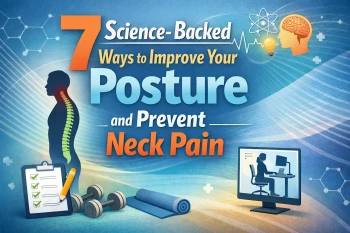
The topmost vertebra in your spine is called the C1 vertebra, and it's responsible for a lot of vital functions. This bone supports your head, protects your spinal cord, and allows you to move your neck. So when it's out of alignment, it can cause some serious problems. In this blog post, we'll talk about what can happen when the C1 vertebra is misaligned and how chiropractic care can help.
Problems when the topmost vertebra in your spine is misaligned
If a vertebra becomes misaligned in your spine, known as subluxation, it can have many negative effects on the body. The subluxation can cause nerve interference which can lead to muscular pain and tension, circulatory problems, decreased range of motion, and a weakened immune system. Treatment for subluxation includes chiropractic adjustments and therapeutic exercises that aim to restore proper alignment of the vertebra as well as reduce pain, improve muscle strength and increase mobility. Left untreated, spinal misalignment can continue to worsen over time and reduce the overall quality of life. It is important to address any potential symptoms of subluxation right away to maximize your health and well-being.
The most common symptom of a misaligned C1 vertebra is headaches
Headaches can be caused by a multitude of factors, ranging from stress to tension, but many people are unaware that head pain could be the result of a misalignment in the C1 vertebra. This misalignment, called an atlas subluxation, does not typically have any discernible physical damage, making it difficult for physicians to diagnose; however, headaches are the primary symptom associated with this issue. Fortunately, there is a wide range of treatment options available for those suffering from atlas subluxation-induced headaches, including chiropractic sessions and at-home exercises designed to relieve both short- and long-term symptoms. By seeking prompt treatment when headache issues present themselves, individuals can find relief from pain and get back to living their best lives.
Other symptoms can include neck pain, dizziness, and fatigue
Many people don’t realize that neck pain, dizziness and fatigue can be among the symptoms of a wide range of medical issues. While these are not always caused by serious illnesses or injuries, consulting with a doctor can help determine the underlying cause and provide proper treatment to reduce pain and improve overall health. In some cases, neck pain and dizziness may be related to poor posture or minor sprains or strains. Fatigue is often a sign that a person’s body is struggling to cope with illness or stress due to other underlying problems. Taking proper precautions, such as examining one's lifestyle habits, seeking medical attention when needed, and getting adequate sleep can help mitigate these symptoms.
Evaluation with an upper cervical doctor
If you believe that your upper cervical spine is not properly aligned, it’s important to seek professional help. A chiropractor specializing in upper cervical alignment can evaluate your C1 vertebra, which could be the source of your discomfort and misalignment. When you visit a chiropractor for this issue, they may use x-rays or manual palpation to determine if the spinal adjustment would benefit you. Additionally, other healthcare professionals such as physical therapists and physicians may also be able to determine if upper cervical misalignment is the cause of your discomfort. Regardless of who evaluates you, it’s important to have an evaluation in order to get the right diagnosis and treatment plan.
Treatment for a misaligned C1 vertebra
If you have a misaligned C1 vertebra, upper cervical chiropractic is the treatment most likely to correct it. Through a series of spinal manipulations and adjustments, an upper cervical chiropractor can realign the bone, relieving pain and discomfort, along with restoring the range of motion. Other treatments may be recommended to help with the healing process, such as heat therapy or the use of specialized orthopedic devices; however, upper cervical chiropractic has proven to be very successful in treating misalignment of the C1 vertebra.
In certain cases involving physical ailments or injuries, your physician may recommend supplementing other treatments in the form of massage therapy and/or physical therapy. While individual results may vary, these additional therapies have been known to treat a variety of conditions from muscle pain to lower back pain. A well-prepared massage therapist uses many different techniques to reduce tension in both the muscles and connective tissue which can significantly reduce discomfort. Physical therapists focus on overall movement patterns and strength by using various exercises and stretches that target specific muscle groups to help optimize performance and prevent further injury. Depending on the situation, either treatment may be beneficial but consulting with your doctor is always best before deciding on a course of action.
A misaligned C1 vertebra can cause a number of problems, the most common being headaches. If you suspect that your C1 vertebra is out of alignment, make an appointment with us today, and let us help you get on the road to feeling better.






Leave a comment